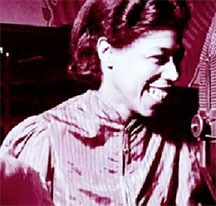Where Death was Kind
Long had I thought
Of death
And the n they told me
You were dead.
I had seen him
Sitting in the ante-room
Eager to be summoned,
So when I heard
You had received him
I was silent.
I went to see you
Lying in death’s embrace
I was afraid –
I thought the sight
Would tear my heart
To pieces,
And my anger would rise
Against death the intruder.
When I looked
Into your lovely face
And saw the sweet peace
That his kiss
Had implanted,
I could not weep,
And I could not be angry.
Ah, sweet is death,
And kindly,
To those who suffer
Unbearable agony;
Sweet was death’s kiss
Upon your lips –
Beloved one
To whom
He gave His Peace
Una Marson
Una Marson (1905-65) was a Jamaican poet who occupies an important place in the developing years of Jamaican writing, and indeed in West Indian literature without the critical attention to give it justification. For the range of activities and developments of which she was a part and to which she has contributed she is an under-represented and relatively little known poet.
Marson was a poet, playwright, feminist, political activist, advocate for racial pride and equality, journalist, editor and radio producer. After leaving Hampton High, a girls boarding school in rural Jamaica, she first worked as a stenographer. She then moved on to her most active years in writing, cultural and political activism between 1928 and 1949 before moving into a ‘dark’ period until 1965. Generally it seems not a great deal is known about her personal life, and especially after 1949 when reports are conflicting. But she seemed extremely active travelling back and forth between Jamaica and many other countries including England, USA and Israel.
According to Denise de Caires-Narain, Una Marson did not receive critical attention largely because of gender and politics. She was a

